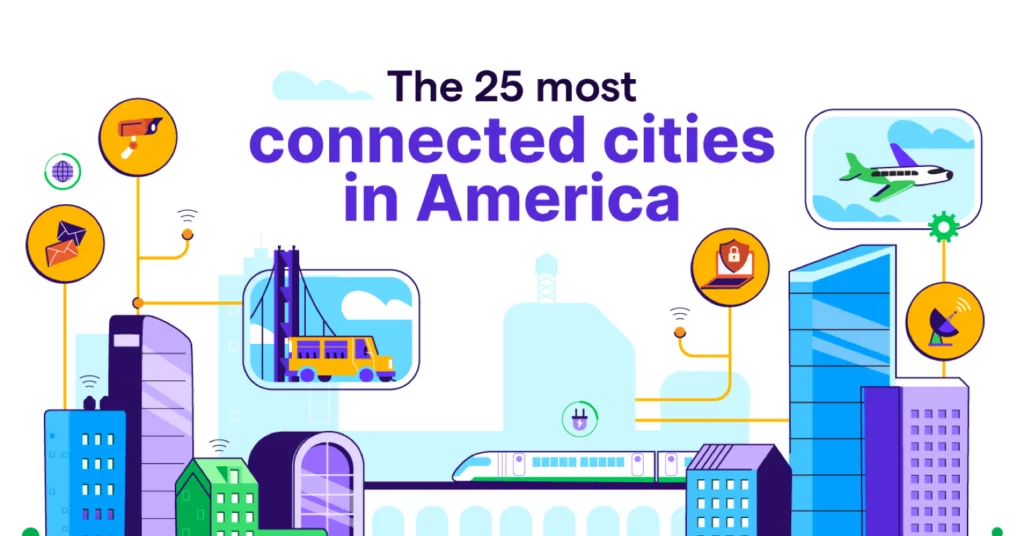Americans rely on all manners of connections to live, from doing business across the country to building social support systems digitally. More and more, our well-being depends on our ability to plug into a network of websites, transit corridors, and tech innovations. But those connections aren’t equally accessible to all Americans.
Fortunately, we’re making strides toward greater interconnectedness all the time. Recent infrastructure bills like the INVEST in America Act promise to boost connections in the form of highways, bridges, airports, and electric car charging stations — but also by expanding broadband access.
All these different kinds of connections work together. So we thought, why not see which cities make it easiest to make connections socially, digitally, and even in our daily commutes?
How we found the most connected cities in America
We analyzed the largest US cities across four pillars that enable connections and growth:
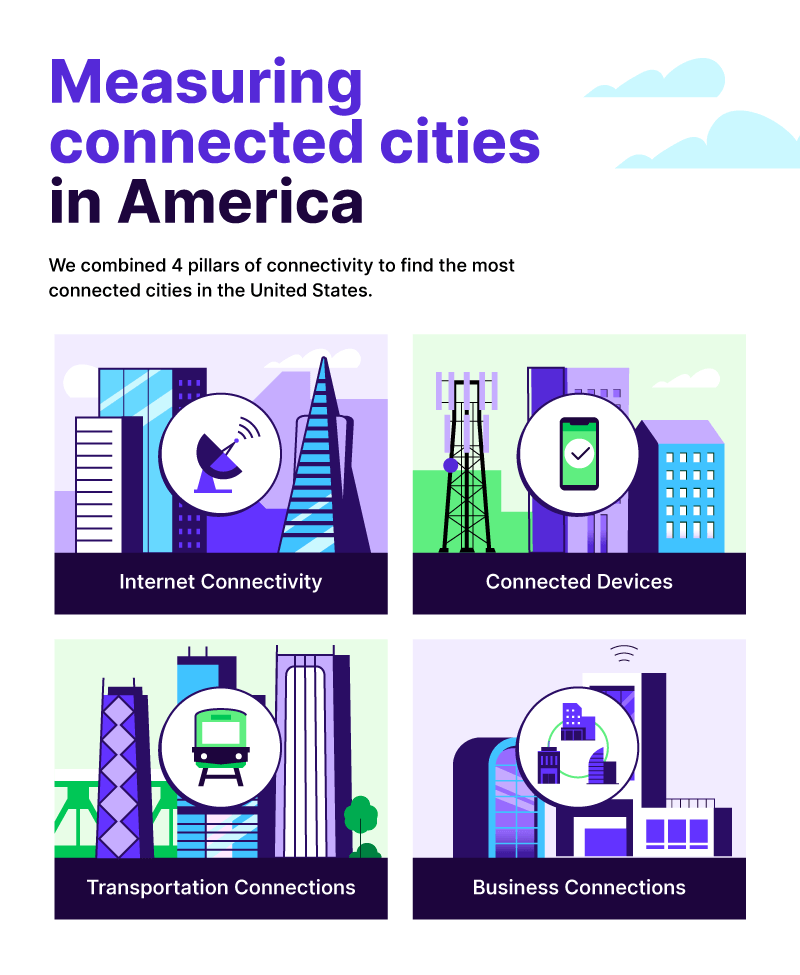
- Internet connectivity: How easy is it to find a fast connection? From 5G to WiFi hotspots and home internet, can residents connect to the web?
- Connected devices: How many residents have a smartphone, tablet, desktop, or laptop at home? How many households have no computer at all?
- Transportation connections: Locally and globally, how easily can city dwellers get around and out? This category includes sky connections, percentage increases in traffic, and ease of moving between modes of travel, like from ferry to bus. It also includes the density of electric vehicle charging stations.
- Business connections: What is the density of both co-working spaces and incubator programs to launch startups, foster community connections, and boost the local economy?
Each pillar received a score from one to 10 (10 being the highest). Then we took the average of those four scores to find the overall connectedness of US cities.
The 25 most connected cities in America, mapped
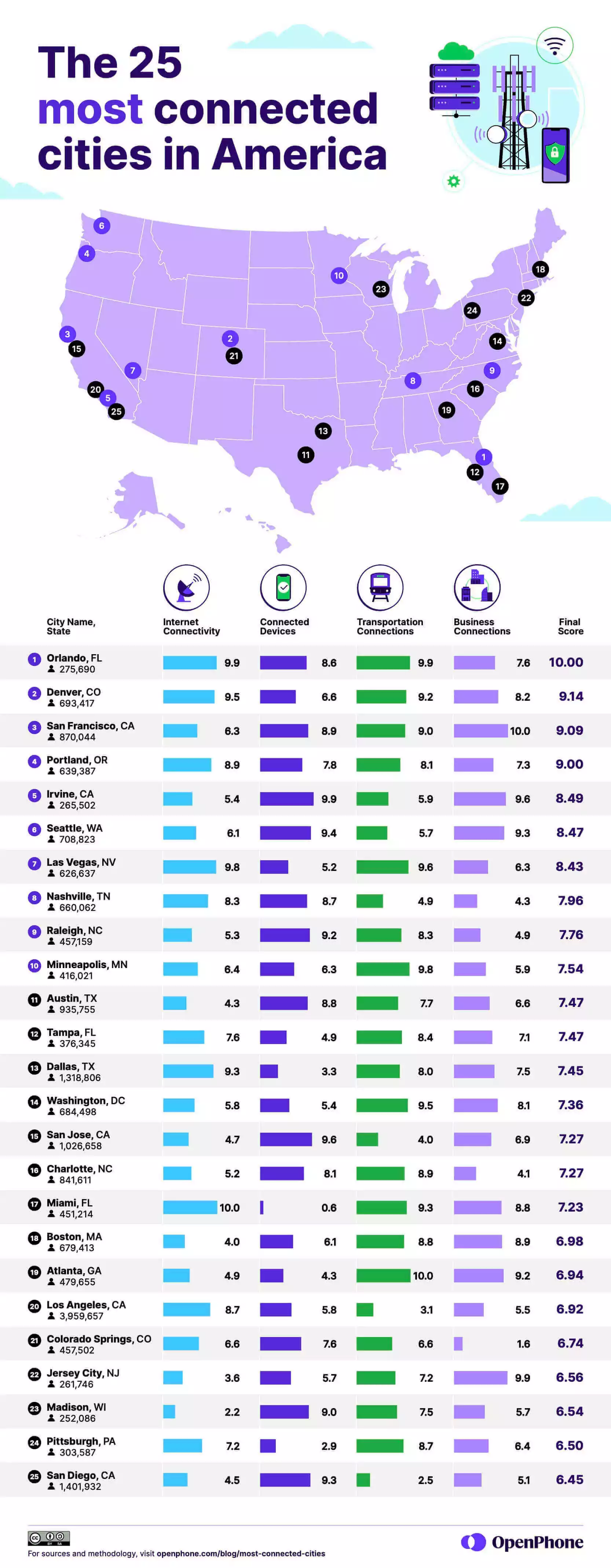
7 of the top 25 most connected cities are on the west coast. These cities benefit from an established climate of innovative companies and all the digital connectivity that comes with it. From #4 Portland‘s Nike to #6 Seattle‘s Amazon (we’re not forgetting its four-story office in #5 Irvine). While #3 San Francisco is the nerve center for startup culture. The City by the Bay has quadrupled the number of startup incubator programs as the next largest city, New York City, and earned the highest score in the Business Connections category.
California alone is home to five of the top 25 most connected cities, the aforementioned San Francisco and Irvine, plus #15 San Jose, #20 Los Angeles, and #25 San Diego.
Three of the top 25 cities are in Florida, a state that has been hitting the headlines over the past few years as a new hub for technology and innovation. Florida added more tech companies in 2021 than any other state, and #1 ranked Orlando’s local startup scene is finally blossoming. #17 Miami scored perfectly in the Internet Connection category. The city has the most free WiFi hotspots per capita of all cities included in the ranking, with nine for every 1,000 residents. #12 Tampa also makes the list.
#19 Atlanta is famous for being home to one of the world’s busiest airports. In 2021, the Hartsfield-Jackson Atlanta International Airport (ATL) served 75,704,760 air passengers. What may be a surprise is the city’s abundance of electric charge stations. It’s no wonder the city scored perfectly for Transportation Connections.
Medium means more when it comes to connected cities. When we look purely at the 25 most connected, the average city is home to about 760K. Slice out the top 10, and it falls to city populations averaging 550K. Cities with medium-sized populations offer an abundance of connections to properly serve the local population.
To dive into all the sources and metrics we used in evaluating these categories, check out the methodology section for the complete list and a detailed approach.
#1 Orlando: planes, trains, and hotspots
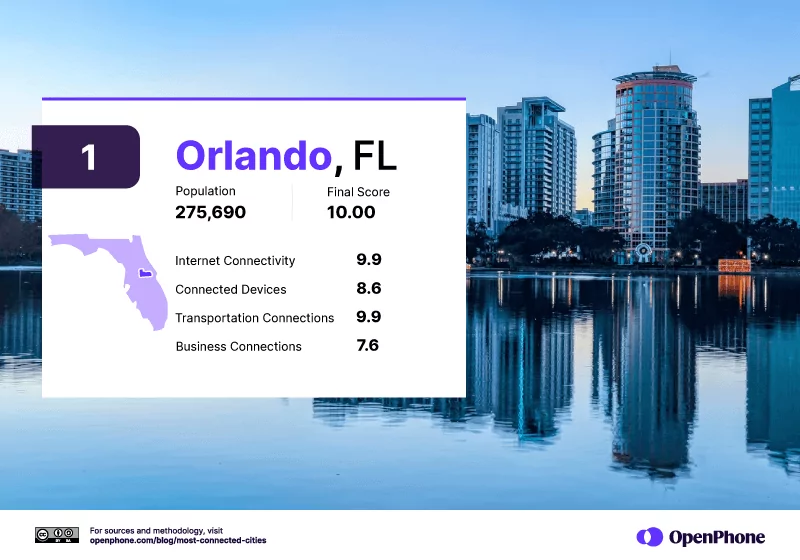
Small but mighty Orlando is a digital tour de force, ranking #2 in the rate of hotspots per 1K people and #2 on transportation connections overall, despite being on the smaller side, with under 300,000 total residents.
With unique incubators catering to local strengths, like the tourism industry, Orlando’s history with the Disney company and Cape Canaveral, and its strong connections, have rocketed its technological imagination into the stratosphere. Its bustling airport connections and commitment to electric charging stations contribute to its stealing the top spot from larger cities. And its performance can only get better as Orlando launches its biggest ever airport expansion project, including a much-anticipated rail line connecting the south terminal with Miami, Fort Lauderdale, and Palm Beach this year. Use the existing light rail to commute to four existing stations (one underneath a new 30,000 square foot co-working space downtown).
#2 Denver: Rocky Mountain, solid WiFi
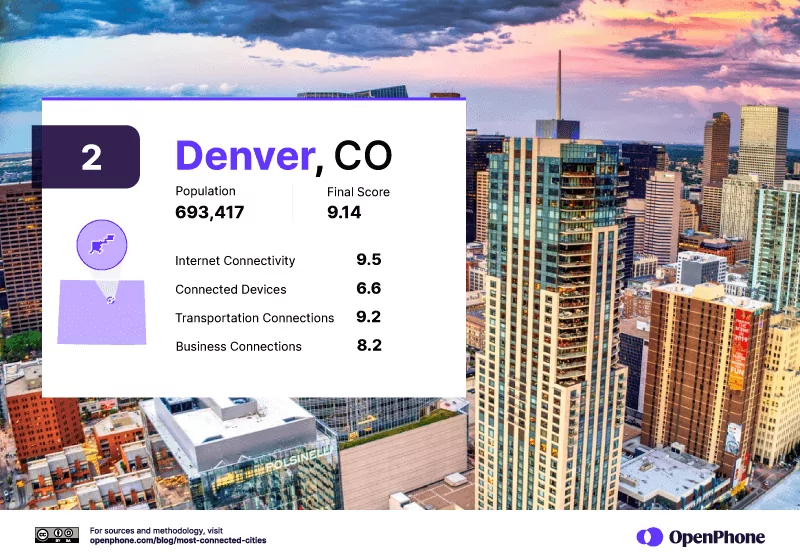
Denver’s highest score is in internet connectivity. With winning home internet scores, 5G service, and tons of WiFi hotspots, it’s not hard to find a place to work in the Mile High City. There’s public WiFi in the city near civic buildings, as well as in schools and libraries and tons of great cafés in this foodie town, so you can internet surf while you eat your Colorado-style pizza (you can even look up what that is).
Since Denver reports the highest percentage of computer owners who have the internet at home, many won’t need it. Either way, you can take your favorite device to unique co-working spaces, including sustainably-minded green spaces with plants, matcha, and yoga on-site, and an accelerator program just for cannabis ventures.
#3 San Francisco’s startup gold rush
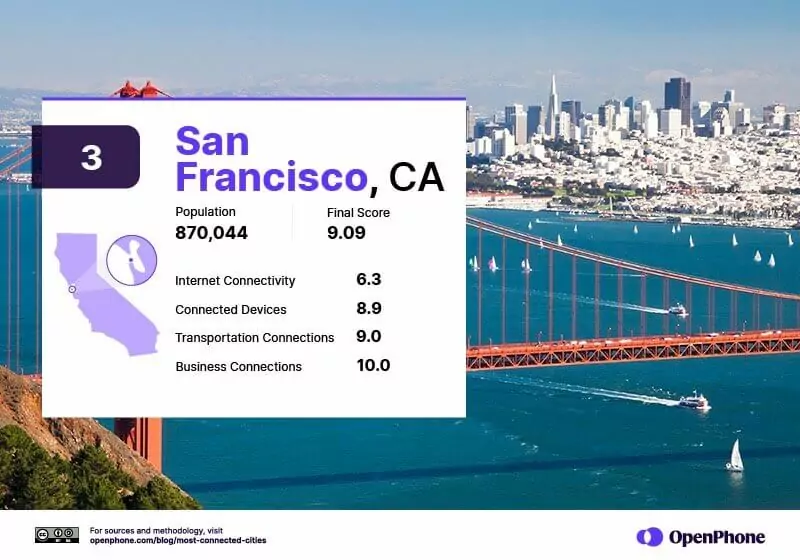
No city can outshine San Francisco’s business connectivity, with quadruple the startup incubators and accelerators of even New York City. In 2021 alone the SF Bay Area received over $100 billion in venture capital funding. The Golden City’s unicorns are born at famed incubators like Y Combinator, which helped companies like Dropbox, Stripe, and OpenPhone get their start.
Public WiFi is also spread throughout the city for easy access, with a concentration of hubs in Nob Hill, downtown, the Tenderloin, and Civic Center neighborhoods. Not to be caught without a smartphone, San Franciscans score high on connected devices. More than 80% of city residents say they have a computer and internet connection at home.
Scrolling while in transit whether catching the BART across town or jumping on a ferry is a breeze — San Francisco offers extensive public transportation, from bus to rail and even on the water.
#4 Portland: organic all-arounder
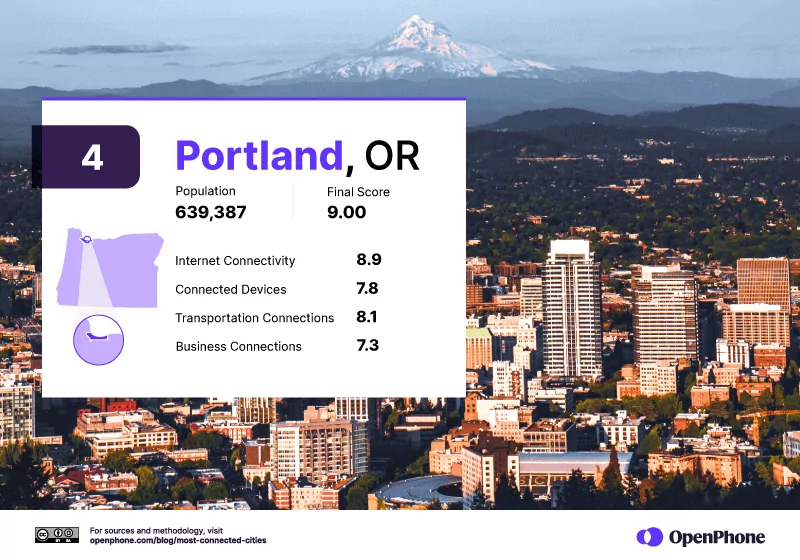
If Portland stands out for anything on this list, it’s being a fantastic all-arounder. Its residents enjoy high home computer and internet connectivity and have plenty of devices.
They’re known for working on community projects to gain support for future light rail expansions (some of the proposals have even included a provision for an environmentally-friendly “bicycle freeway”). As it is today, public transportation connections are batting way above average, competing with some of the largest cities in the country. That makes it easier for residents to cruise down the hills on the light rail and check their Instagram using a hotspot at Stumptown Coffee, then spend the day in one of the startup incubators in the city.
You can find mentoring and networking in fields from cleantech to biosciences and even storytelling with virtual reality.
#5 Irvine: computers and electric cars galore
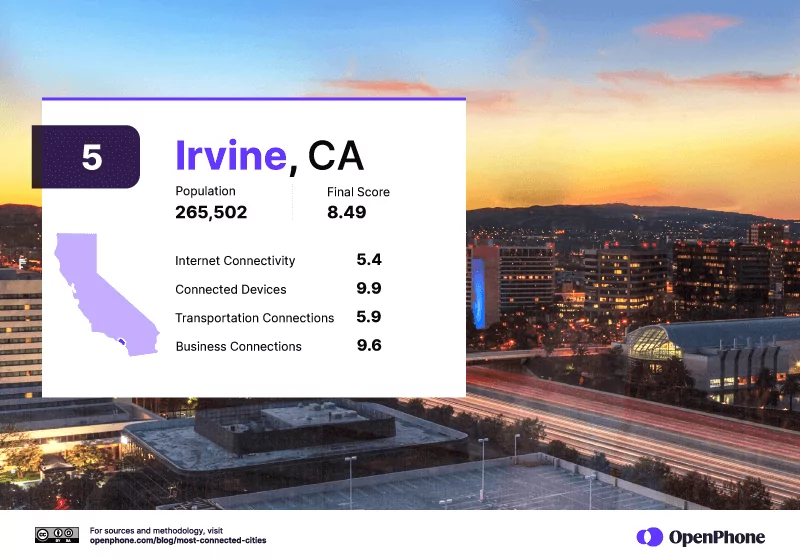
This Southern California gem scores highly for its transportation connections. That’s in part because the sprawling planned community covers so many miles that city leaders have needed to make room for solutions.
The rail system carries passengers south into San Diego County or far into the desert towns north of L.A., like Palmdale, and comes with bike cars to make it easy for commuters to use pedal power to their final destination. Are you committed to your vehicle? Irvine is 4th in the nation for electric car chargers (and the highest in the density of stations).
Irvine also takes the nation’s #1 spot for the proportion of residents saying they own a desktop or laptop. With a device and an electric car, you’ll be ready to explore incubators and co-working spaces that have emerged around hubs like the University of California.
As the runner-up in business connectivity, it’s worth calling out that Irvine comes with sky-high proximity to co-working spaces — you won’t ever be far from potential new business partners or a sound-proof phone booth.
#6 Seattle: can’t rain on your startup
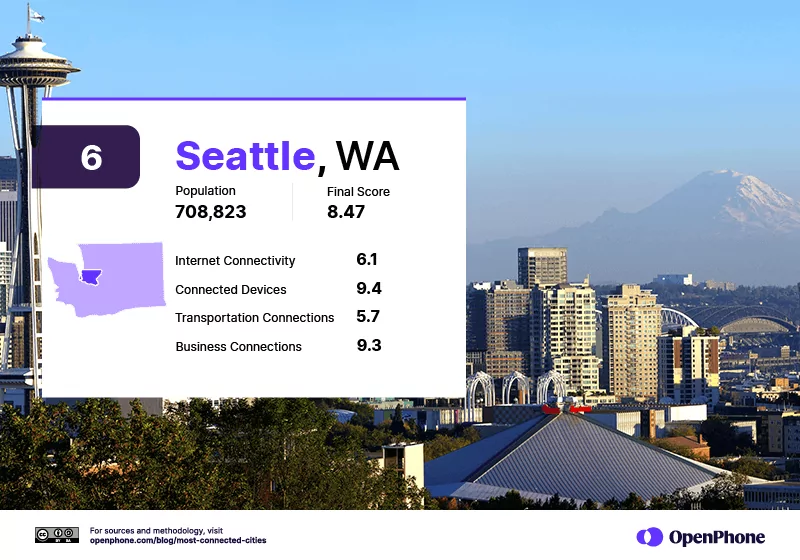
From atop the futuristic Space Needle, you might be able to guess that Seattle has long fashioned itself as a tech-forward city. That reputation has only expanded since Microsoft and Amazon took up residence nearby in this Washington city.
The Emerald City, with a “connected devices” score rivaling that of the techies in San Jose’s Silicon Valley, proves its residents value their computers, tablets, and smartphones. The city provides easy access for geared-up locals to nearly two public hotspots per resident scattered through downtown Seattle.
There are almost as many incubators and co-working spaces here as in #1 San Francisco. Seattle is also upping its diverse public transportation options with added light rail lines planned for northern and southern suburbs, joining buses and ferries that serve this connected city throughout Puget Sound.
#7 Las Vegas: clear skies, strong signal, can’t lose
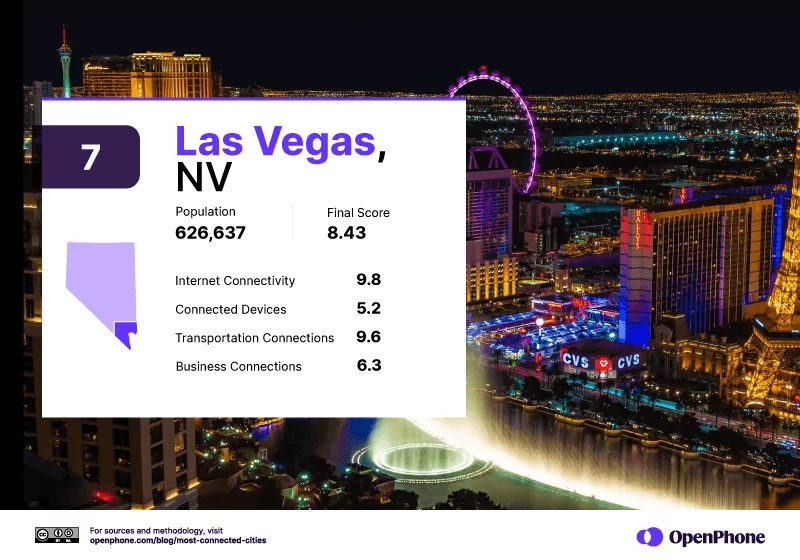
When it comes to per capita internet hotspots, only Miami and Orlando top Las Vegas. Las Vegas’ civic, private network provides blazing-fast 5G — while many other cities are stuck on slower connections. The network rolled out to schools and families during the pandemic, and there are plans to cover the entire city. Right now, you can use public WiFi to start surfing near civic buildings like libraries, parks, and the Las Vegas Convention Center (casinos along the famed strip almost always offer free WiFi hotspots).
Lest you think Las Vegas’ transportation scores seem ho-hum, wait until you cruise the underground tunnels in a Tesla. The Vegas Loop project may eventually connect important points around town and deliver residents straight to the airport. No word yet if it will be able to take you to co-working spaces like Gold Spike, which, true to the Vegas vibe, transforms into a nightlife venue after-hours.
#8 Nashville: get on this growing music train
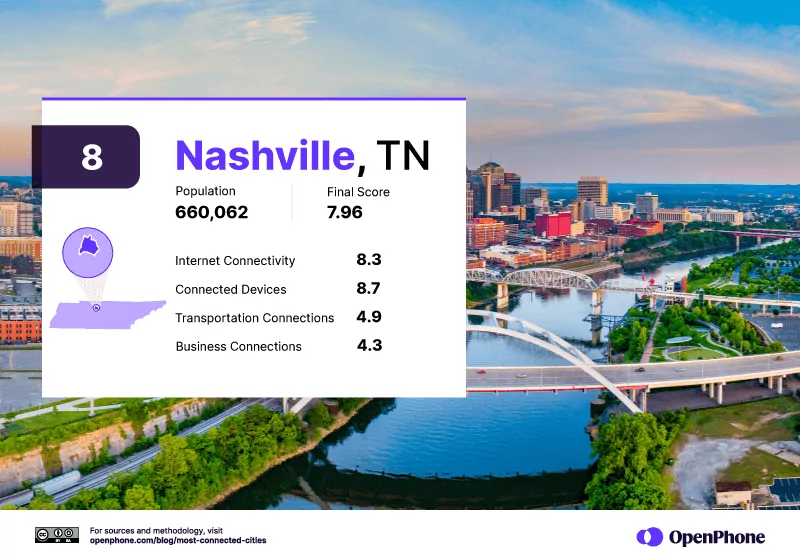
When Music City residents get home from the Grand Ole Opry, they might head to startup incubators like the Nashville Entrepreneur Center, which heads up unique programs like the Project Music incubator — the only accelerator program dedicated to launching businesses in the music industry.
Nashville provides WiFi in and around public buildings in the Nashville core, including parks, nature centers, and community centers. Still, with plenty of computing devices at home, residents may not need to use them. They can connect to the business community at co-working spaces that speak to the city’s creative spark. You can choose from gorgeous spaces with nap rooms, recording studios, and bike storage for when you’re commuting. Just jump on the WeGo Star train, which is looking to expand service to Clarksville.
#9 Raleigh: southern connections
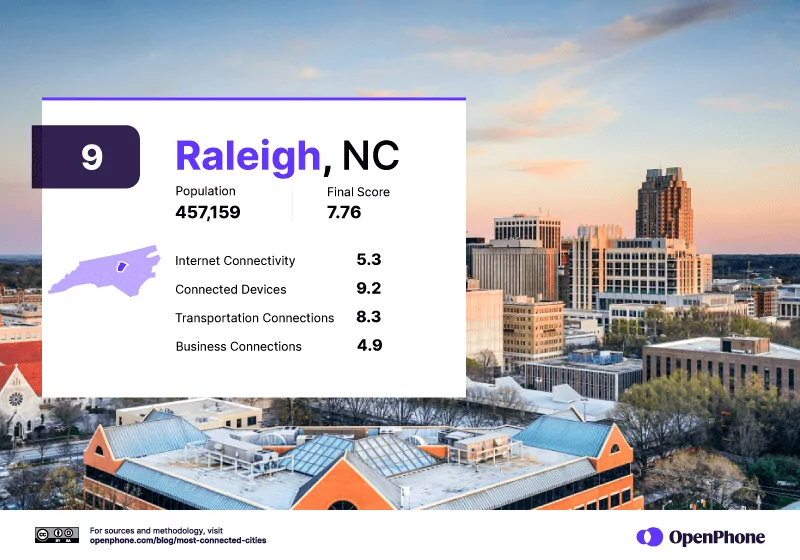
In the shadow of multiple universities, Raleigh boasts hundreds of companies with high-tech expertise from biology to finance. You can get around on the GoRaleigh bus and soon residents may get more options as they rally for a new rail project. A significant airport expansion will also add 23 gates (expanding capacity by almost 200%).
Current Raleighites from the highly educated Research Triangle area find computers and smartphones a must-have. Only three cities can beat Raleigh with the number of homes with a computer where IBM and other hybrid teams work locally. If you don’t have a device, find your way to one of the city’s co-working spaces where can work inside spaces like an old loading dock or a converted warehouse.
#10 Minneapolis: the Midwest’s connection hub
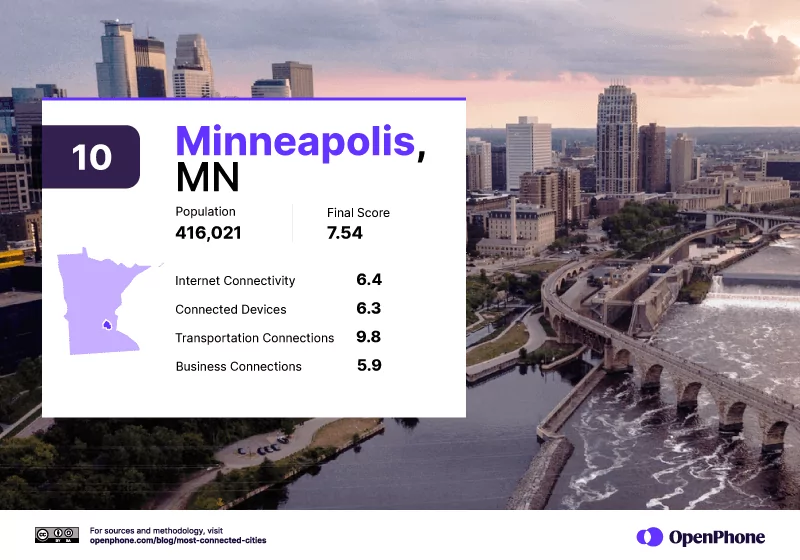
An infrastructure darling, Minneapolis has the best transportation system per capita of any city in America. Even for the raw number of transportation connections, Minneapolis stands alone in the top ten as a city with fewer than half a million residents. LRT light rail trains come every 15 minutes to whisk riders from their snowy street corners and take them almost anywhere in Minneapolis or St. Paul or to one of two airport terminals. And the light rail plans to add another 116 miles by 2040 to accommodate more riders from distant ‘burbs.
If you’re not writing your business plan from one of the industrial-chic co-working spaces in the downtown core, you can grow your business with free public WiFi. There’s connectivity covering almost 100% of the city from 117 access terminals designed to reduce digital inequality.
Wrapping up
The digital age has given us new ways to be connected.
We reach out from municipal hotspots through the devices we use and even the evolving ways we power the cars we drive. We fly. We fold our bikes and stash them on the light rail while headed to our favorite coworking space.
Today’s most connected cities invest in cutting-edge innovations to make their citizens’ lives better. The cities that will thrive in the future will provide the infrastructure for their citizens to connect to the global economy. This will allow people to foster the business connections they need to expand their networks and revenue.
With remote workers moving to new cities and reshaping urban geography, the most connected cities will be the most attractive to live in. Our research has revealed that the most connected cities are prime for growth in the increasingly digital future.
Methodology: How we measured the most connected cities
Starting with the 83 largest cities in America (250K+), we scored and ranked each according to 4 different categories that facilitate connectivity — from devices and internet connections to transportation and business networks.
For each category, we normalized the raw data by calculating a relative score of 0-10 with 10 being the best, according to a range of factors (details for factors included below).
- Internet connectivity (IC, double weighted)
- Connected devices (CD, double weighted)
- Transportation Connections (TC, single weight)
- Business connections (BC, single weight)
To find the most connected cities in America, we used the following formula to score each city between 0 and 10, with 10 being the best.
Overall Score = Average ( (IC x2), (CD x2), (TC), (BC) )
Note: We excluded cities located within 30 miles of one another, for instance, Durham and Raleigh, NC in order to favor geographic diversity and mitigate regional factors that applied to multiple cities in the area.
Internet connectivity: How we measured
The final category score is an average of the following three factors.
Home internet score (double-weighted): Using data from the 2018 American Community Survey from the U.S. Census Bureau, we found which cities had the highest number of households with both a computer and access to the internet regardless of connection type. Cities with the highest proportion of households reporting both a home internet connection and computer received higher scores.
5G score: Cities with access to 5G connectivity were determined using a list from Android Central (updated February 8, 2022) of AT&T, Verizon, & T-Mobile 5G availability and the Verizon coverage map. 5G access received a score of 10; those still awaiting access received a half-score of 5.
Density of WiFi hotspots: We collected the total number of WiFi hotspots available in each city according to WiFiMap.io and computed the density according to the city population. Cities with more WiFi hotspots per resident received higher scores.
Connected devices: How we measured
The final category score is an average of the device score and population with “no” computer score.
Device Score: Combined and evenly weighted score of the four following factors.
- Desktop or Laptop at Home: Cities with higher proportions of households reporting they have a desktop or laptop at home receive higher scores.
- Smartphone Ownership: Cities with higher proportions of households reporting they have a smartphone at home receive higher scores.
- Tablet or other portable devices: Cities with higher proportions of households reporting they have a tablet or other portable device at home receive higher scores.
- “Other” computing device(s): Cities with higher proportions of households reporting the presence of a device of another sort at home receive higher scores.
Population with “no” computer: Cities with higher proportions of local residents who reported “no” computer in household receive lower scores, those with smaller proportions have the highest scores.
All data in this category was sourced from the 2018 American Community Survey from the U.S. Census Bureau.
Transportation connections: How we measured
The final category score is an average of all four factors, with normal weight on each with the exception of electric charging density which only received half-weight.
Density of air traffic: We measured the density of air passenger traffic against the local population.
Highway vehicle mileage increases: Using TRIP’s report on vehicle mileage increase at the state level, those with greater increases in road traffic received higher scores.
Density of public transit: The Bureau of Public Transportation collects raw counts of connections between various forms of transportation called “Intermodal Connections.” We measured the density of these connections in each city, and cities with more connections per resident received higher scores.
Density of electric charging: The density of electric charge stations to the local population, higher is better.
Business connections: How we measured
The final category score is an average of the following two factors.
Density of coworking spaces: We used Yelp.com to compile a list of coworking spaces in each city, those with more per resident received higher scores.
Density of incubators and accelerators: We collected details of incubators and accelerators across the nation from Ideagist, Seed-DB, and Golden, cities with the highest concentrations received the highest scores.
